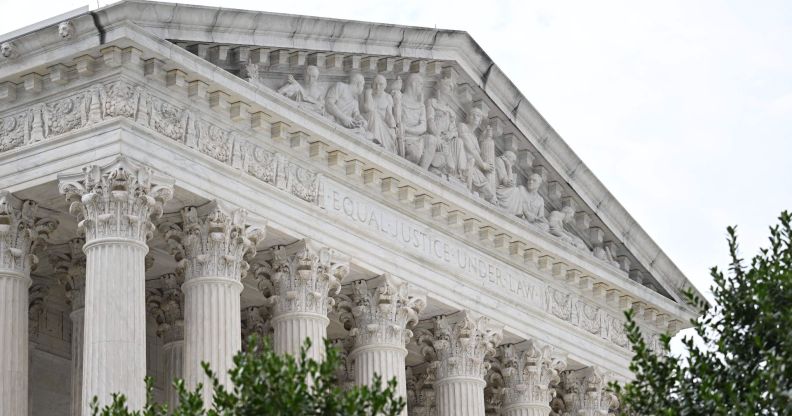US Supreme Court says Colorado designer can refuse LGBTQ+ customers: ‘Licence to discriminate’

The US Supreme Court released its decision on the 303 Creative LLC v. Elenis case on Friday 30 June (Jim Watson/AFP via Getty Images)
The US Supreme Court has given a Christian wedding-website-designer from Colorado the right to refuse to serve LGBTQ+ couples.
In a split decision of six to three, on Friday (30 June), the justices ruled that Denver wedding website designer Lorie Smith has the right under the First Amendment to refuse to serve LGBTQ+ couples looking for her services.
As a result of the ruling, she cannot be punished under The Colorado Anti-Discrimination Act (CADA).
The act not only bans businesses open to the public from discrimination based on race, sexual orientation and other identities, but also from “publishing any communication that says or implies that an individual’s patronage is unwelcome because of a protected characteristic”.
According to the case overview, Smith argued that because her business is “expressive, artistic and customised”, she has a First Amendment right not have to comply with CADA and provide services to weddings that she is ideologically opposed to due to her Christian faith.
She reportedly wished not only to be able to refuse to make wedding websites for same-sex couples, but also to “post a message on her own site explaining her religious objections to same-sex weddings”.
Associate justice Sonia Sotomayor said in a statement after the ruling: “Today is a sad day in American constitutional law and in the lives of LGBT people. The Supreme Court of the United States declares that a particular kind of business, though open to the public, has a constitutional right to refuse to serve members of a protected class.
“The court does so for the first time in its history.
“By issuing this new licence to discriminate, in a case brought by a company that seeks to deny same-sex couples the full and equal enjoyment of its services, the immediate, symbolic effect of this decision is to mark gays and lesbians for second-class status.”
Alleged false information in the case
It was reported on Friday (30 June) that a crucial piece of information in the case was false, with a couple cited as enquiring after Smith’s service reportedly found not to be legitimate customers.
Smith and her lawyers, the right-wing Christian advocacy group Alliance Defending Freedom (ADF), cited an enquiry for Smith’s services from a gay couple, Stewart and Mike, as part of the case.
Stewart, however, said he did not ask for Smith’s website design services, and that he was married to a woman at the time of the court enquiry, according to an investigation into the case by New Republic.
According to Smith’s court filings, Stewart contacted her in September 2016, asking for “design work” for “invites, place names and a website” for his upcoming wedding in 2017.
However, when New Republic contacted Stewart, he told her that he was hearing about his “enquiry” and the court case for “the first time”.
He reportedly said: “If somebody’s pulled my information, as some kind of supporting information or documentation, somebody’s falsified that. I wouldn’t want anybody to… make me a wedding website.
“I’m married, I have a child – I’m not really sure where that came from. But somebody’s using false information in a Supreme Court filing document.”
Other cases seeking to refuse services to same-sex clients
There have been several cases of business owners facing the Supreme Court in order to fight for the right to refuse customers based on sexual orientation.
Jack Phillips, the owner of Masterpiece Cakeshop, won a case in 2021 on the grounds of “religious freedom” after refusing to serve a gay couple, while Barronelle Stutzman, the Christian owner of Arlene’s Flowers, settled her case after refusing to provide flowers for a same-sex wedding.
Elaine and Jonathan Huguenin, who had their appeal denied the US’ highest court, refused to provide photography services for the commitment ceremony of a lesbian couple.
How did this story make you feel?

